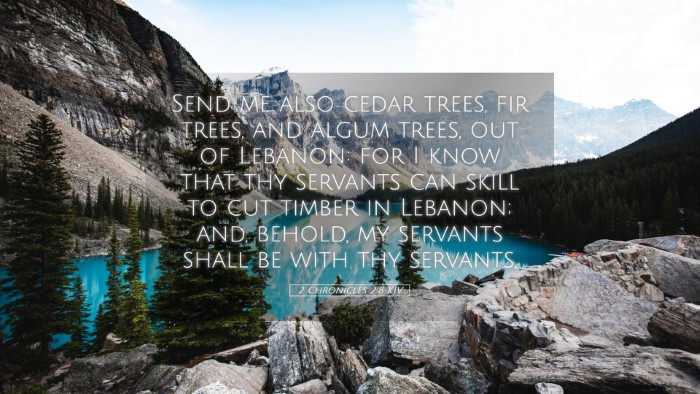Commentary on 2 Chronicles 2:8
Verse Context: 2 Chronicles 2:8 states, “Send me also cedar trees, fir trees, and algum trees out of Lebanon; for I know that thy servants can skillful to cut timber in Lebanon: and, behold, my servants shall be with thy servants.” This verse is part of the narrative where King Solomon prepares to build the Temple for the Lord, seeking assistance from King Hiram of Tyre.
1. Historical and Cultural Context
Significance of the Temple: Solomon’s request is steeped in cultural and religious importance. The Temple's construction was not merely a physical task; it represented the fulfillment of God’s promise to David and the establishment of a central place of worship for Israel. The choice of materials, notably the cedars of Lebanon, symbolizes the grandeur and holiness of this project.
2. Theological Insights
God’s Providence: Solomon’s request also illustrates God's providential hand in the affairs of men. By choosing Hiram, a king known for his materials and craftsmanship, Solomon acknowledges that all creation belongs to God. This dependence on foreign resources showcases the interconnectedness of nations under God's sovereignty and the universal need for divine favor in great endeavors.
3. Commentary Excerpts
- Matthew Henry: Henry emphasizes that Solomon’s call for materials was not only a practical step but also a theological one; it signals a desire to honor God with the best offerings. He notes the symbolism in the choice of trees: cedar for strength and durability, fir for beauty, and algum for its rarity and preciousness. Each material reflects God’s greatness and the splendor He deserves.
- Albert Barnes: Barnes focuses on the specific request for wood from Lebanon, noting its reputation for quality. He explains that Solomon’s leadership and careful selection of laborers encapsulate his wisdom. This also portrays a collaborative spirit between Israel and Tyre, emphasizing the need for unity in purpose while building the house of God.
- Adam Clarke: Clarke elaborates on the technical skills of Hiram’s servants, suggesting that they were famous for their craftsmanship. His commentary points to the synergy between the divine and human efforts. The mention of these materials hints at the meticulous planning required in works dedicated to God, advocating for excellence in all things pertaining to worship.
4. Practical Applications
Excellence in Ministry: For today’s pastors and church leaders, Solomon’s example serves as a foundation for pursuing excellence in ministry and worship. It encourages the understanding that our resources, time, and efforts dedicated to serving God should reflect His character—holy, honorable, and worthy. The best should be given to God.
Collaboration in the Church: Just as Solomon reached out to Hiram for support, modern churches should seek collaboration and partnerships to fulfill their missions. The global nature of the Church calls for a spirit of assistance among believers so that the Kingdom of God may be built up effectively and harmoniously.
5. Conclusion
In conclusion, 2 Chronicles 2:8 encapsulates profound theological themes of divine sovereignty, communal effort, and the dedication of resources for God’s glory. This passage serves as a rich source of reflection for scholars, motivating them to examine how they might contribute intentionally and collaboratively to the things that honor God.


